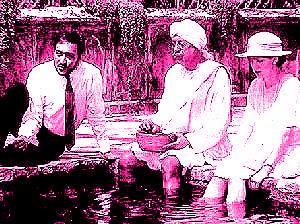Film Review

A Passage to India is not David Lean's greatest film, perhaps because it tries a little to hard to match up to the standards of the director's previous monolithic works, The Bridge on the River Kwai (1957) and Lawrence of Arabia (1962). The film is overlong, somewhat plodding in its first half and lacks the almost manic intensity that ignites E.M. Forster's classic novel. But, whilst not perfect, it still manages to be a beguiling, deeply moving film, peppered with moments of exquisite visual poetry.
The cinematography is excellent, as you would expect from a David Lean film, vividly evoking the location and the era in which the story takes place. The film boasts some terrific performances from a magnificent cast, with Judy Davis and Victor Banerjee both totally convincing as the two main protagonists who have to confront and overcome their latent racial predjudices. The only false note on the acting front is Alec Guinness's portrayal of a native Indian, which leaves a queasy aftertaste and would now be considered by some to be a grotesque example of racial caricature. The lynchpin of the film is Peggy Ashcroft, whose startlingly humanist portrayal of the colour-blind Mrs Moore provides one of cinema's most powerful broadsides against racial intolerance.
© James Travers 2009
The above content is owned by frenchfilms.org and must not be copied.
Film Synopsis
In the 1920s, Adela Quested makes the journey from England to India, where she intends to marry her fiancé, Ronny Heaslop, the magistrate of a provincial town named Chandrapore. She is accompanied by Heaslop's elderly mother, Mrs Moore, who, having barely set foot in the country, becomes disgusted by the way in which the local population suffer under British colonialism. Soon after their arrival, the two Englishwomen get to know Professor Godbole, an amiable if eccentric Brahmin scholar, and school superintendent Richard Fielding. One evening, Mrs Moore strays from a club for British residents and enters a mosque. Here she meets Aziz Ahmed, a local doctor, who responds warmly to her courtesy and complete lack of racial prejudice. Having grown tired of the anglicised version of India, Mrs Moore and Adela declare that they want to see the country as it really is. They are delighted when Aziz offers to take them to the Marabar Caves, a place that few British ever visit. The well-planned excursion ends disastrously. On her return to Chandrapore, Adela insists that Aziz attempted to rape her. The only person that can help Dr Aziz now is Mrs Moore, but she is already on her way back to England...© James Travers
The above content is owned by frenchfilms.org and must not be copied.
Similar Films
Here are some other films you may enjoy watching:- Il Gattopardo (1963)
- Germinal (1963)
- Le Cheval d'orgueil (1980)
- Que la fête commence... (1975)
- La Caduta degli dei (1969)
Other related links:
Film Credits
- Director: David Lean
- Script: E.M. Forster, Santha Rama Rau (play), David Lean
- Cinematographer: Ernest Day
- Music: Maurice Jarre
- Cast: Judy Davis (Adela), Victor Banerjee (Aziz), Peggy Ashcroft (Mrs. Moore), James Fox (Fielding), Alec Guinness (Godbole), Nigel Havers (Ronny), Richard Wilson (Turton), Antonia Pemberton (Mrs. Turton), Michael Culver (McBryde), Art Malik (Ali), Saeed Jaffrey (Hamidullah), Clive Swift (Major Callendar), Ann Firbank (Mrs. Callendar), Roshan Seth (Amritrao), Sandra Hotz (Stella Fielding), Rashid Karapiet (Das), H.S. Krishnamurthy (Hassan), Ishaq Bux (Selim), Moti Makan (Guide), Mohammed Ashiq (Haq)
- Country: UK / USA
- Language: English / Hindi
- Support: Color
- Runtime: 163 min
The best films of Ingmar Bergman

The brighter side of Franz Kafka

The very best of Italian cinema
